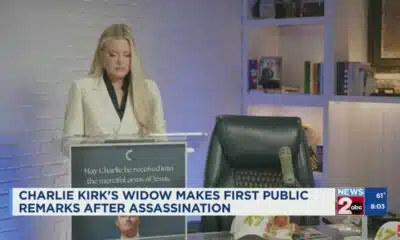News from the South - Texas News Feed
How Texas House became a partner on Senate’s conservative agenda (⛔️⛔️ Note: check character count by selecting text and using cmd + shift + c)
“After years of tension, Texas House emerges as cooperative partner for Dan Patrick and his conservative agenda” was first published by The Texas Tribune, a nonprofit, nonpartisan media organization that informs Texans — and engages with them — about public policy, politics, government and statewide issues.
Sign up for The Brief, The Texas Tribune’s daily newsletter that keeps readers up to speed on the most essential Texas news.
With tensions boiling over in the final days of the 2021 Texas legislative session, Rep. Dustin Burrows, a Lubbock Republican and a top House lieutenant, went out of his way to throw shade at the Senate and its leader, Lt. Gov. Dan Patrick, for letting too many House bills languish.
From the back microphone on the House floor, Burrows rhetorically asked then-Speaker Dade Phelan if he was aware that “less than 50% of the House bills that we sent over were passed by the Senate” — much worse than the success rate for Senate bills sent to the lower chamber. It came shortly after Patrick had flayed the House for killing several of his top conservative priorities.
Four years later, Burrows’ first session wielding the speaker’s gavel is winding down with little of the same inter-chamber acrimony. Conservative priorities that had failed in session after session in the House, from private school vouchers to stricter bail laws, have cleared the Legislature with time to spare. So have once-thorny issues, like property tax cuts, school funding and immigration, that in years past had generated bad blood between the chambers and needed overtime sessions to address.
Many of those now-imminent laws were in the sweeping agenda Patrick unveiled near the start of the session in January, marked by several issues that Gov. Greg Abbott also championed as “emergency items.” All but a handful of Patrick’s priorities — from conservative red meat to top bipartisan priorities to the lieutenant governor’s own pet issues — have made it across the finish line or are poised to do so in the closing days of the session, which ends June 2.
The lack of discord reflects the collegial relations Patrick and Burrows have worked to maintain from the start; Burrows’ apparent desire to avoid drawing Patrick’s wrath and the political damage it inflicted upon his predecessors; and the reality that the House, thanks to the turnover wrought by a bruising 2024 primary cycle, is now more conservative and more receptive than ever to Patrick’s hard-charging agenda.
“The tools that Patrick uses — and I think he uses them as effective as anybody — is he’s aggressive, he’s up front, and he’s early,” said Bill Miller, a veteran Austin lobbyist and political consultant. “He lets you know what’s coming and why and how important it is to him.”
Patrick’s influence — and that of the hardline conservative Senate he oversees — is evident down the homestretch of the Legislature, as a steady drumbeat of his highest priorities make their way onto the House floor as a waystation to Abbott’s desk.
For critics of the dynamic, the most telling case was the House’s move this week to adopt Patrick’s ban on hemp-derived THC products, in lieu of the carefully crafted regulatory bill offered up by one of Burrows’ lieutenants. Patrick’s crusade to eradicate the hemp industry, underscored by his threat to force a special session if the THC ban fell through, met almost no resistance from House Republicans, nearly all of whom stayed silent on the issue throughout the session.
Speaking from the House’s back microphone Friday, Rep. Harold Dutton, D-Houston, jokingly asked whether Texas has a “bicameral legislature” and, if so, whether either of the chambers is “superior to the other.”
“I believe that democracy calls for this house to exercise its authority in as much as or to the same extent that the other side does, and I don’t believe that’s happening,” Dutton said, before echoing his favorite refrain about the Senate: “If they won’t respect us, they need to expect us.”
In a statement, Patrick disputed the notion that either chamber “gets its way over the other” and noted that, without cooperation from the House and Senate, “nothing gets to the governor’s desk to be signed into law.”
“The Speaker and I don’t keep track of what’s a Senate bill or a House bill. That simply depends on the flow of legislation and how we divide up the work as the session progresses to find the best way to pass a bill,” Patrick said. “The Speaker and I, and the members from both chambers, have never had a more positive and collaborative relationship in my 18 years in office and that’s why this session will be the most productive in history on so many major issues.”
Burrows said he and Patrick “began session aligned on many major issues” and kept their “shared legislative priorities” moving by staying in contact.
“As a longtime conservative member of the Texas House, I appreciate the input and perspective from our Senate colleagues in crafting legislation and the support of Lieutenant Governor Patrick in making sure this was a banner conservative session for our state,” Burrows said in a statement.
Democrats in recent weeks had intensified their criticism of Senate Republicans for failing to move on a multibillion-dollar school funding package, sent over by the lower chamber in tandem with a $1 billion school voucher bill that was quickly sent to Abbott and signed into law. The Senate’s lead negotiator, GOP Sen. Brandon Creighton of Conroe, said the delay was a matter of lawmakers doing their due diligence on “the most complex piece of legislation we will consider and negotiate this session.”
Both chambers struck a deal on the $8.5 billion package this week. Just before it advanced out of the Senate Friday evening, Patrick — perched on the Senate dais — took aim at “the media and those outside who said, why is it taking so long?”
“You don’t pass those bills with the snap of a finger, because there are 150 opinions over there and 31 opinions over here,” Patrick said. “So, we shut out the rest, the outside noise, the media who doesn’t even understand how a bill passes. … It’s really been a five-month process, and it’s a masterpiece for the rest of the country to follow.”
This session, Patrick has also taken a special interest in reining in the Texas lottery, which has come under scrutiny over the proliferation of online ticket sellers — known as couriers — and the revelation that a $95 million jackpot in 2023 went to a group that printed 99% of the 26 million possible ticket combinations. Couriers and bulk ticket purchases would each be banned under a last-minute Senate bill that has zoomed through the House and is set to reach the floor on Sunday.
Patrick has also championed a push to more than double the amount of money the state spends to lure film and television production to Texas, with extra incentives for faith-based productions. That measure, Senate Bill 22, also made it onto Sunday’s House floor agenda.
The House has until the end of Tuesday to give initial approval to most Senate bills. The Senate, meanwhile, faces a Wednesday deadline to grant final passage to legislation from either chamber. Senators and House members will then spend the final days of the session reconciling their different versions of bills in closed-door conference committees.
Some of Patrick’s priorities have already cleared those hurdles and been sent to Abbott’s desk, including a measure to allow time for prayer in public schools and create a $3 billion dementia research fund, the latter of which will also need approval from voters in November.
Several priorities of Patrick and fellow hardline social conservatives also are on track to reach Abbott’s desk after stalling in the House in recent sessions. Those include a requirement for public school classrooms to display the Ten Commandments and a law barring residents and governments from countries deemed national security threats from buying property in Texas.
The pressure for the House to pass conservative legislation has also come from within the chamber, with GOP members from the party’s rightmost flank urging Burrows’ lieutenants to push key bills through their committees. On Friday, a group of the House’s most conservative members called on Rep. Ken King, a moderate Republican from Canadian who chairs the influential State Affairs Committee, to advance a bill aimed at restricting the flow of abortion pills into Texas.
“If Chairman King kills a bill that would protect tens of thousands of innocent children from the murder that is abortion, Republicans will be forced to hold him accountable,” Rep. Nate Schatzline, R-Fort Worth, said at a news conference highlighting conservative legislation stuck in limbo.
King’s committee advanced the measure, Senate Bill 2880, hours later.
It was one of a handful of high-priority Senate bills that have been voted out by King’s panel in recent days after being parked there for weeks, including the school prayer measure and a proposal to bar local governments from helping Texans travel out of state to receive abortions. Around the same time, some of King’s bills sent over to the Senate — most of which had been frozen — suddenly began moving. Patrick has denied that King’s bills were purposely being held up.
The House’s hardline ranks have swelled after last year’s wave of GOP primary defeats that saw more than a dozen incumbents ousted, largely over their opposition to vouchers, support for the impeachment of Attorney General Ken Paxton or a combination of both. Others chose to retire and were replaced by more conservative successors, forming a class of insurgent GOP freshmen who make up the bulk of the House’s more than 30 new members — the largest freshman class since 2013.
“There are two things that are working in Patrick’s favor,” said Brandon Rottinghaus, a political science professor at the University of Houston. “Number one, the House is more ideologically conservative than it’s ever been. And two, a lot of the members are brand new.”
Still learning the ropes, many of those new members “are going to follow Patrick’s lead,” Rottinghaus said, “because he is, in some ways, the party’s de facto leader.”
That was especially clear in the debate over THC. King, who carried the Senate’s THC bill in the lower chamber, proposed a version that would have sharply tightened regulations on the hemp industry and restricted which products are allowed to contain THC, while preserving hemp-derived THC edibles and drinks. That was done away with by proponents of a ban, who centered their pitch for a complete crackdown around the idea that Texas would expand its limited medical marijuana program, known as the Texas Compassionate Use Program, or TCUP.
Midway through the House’s THC floor debate, Patrick voiced support on social media for expanding the medical program to allow for more licensed medical marijuana dispensers and let providers operate satellite storage facilities designed to make it easier for patients to fill their prescriptions. Rep. James Frank, R-Wichita Falls, read off Patrick’s post to the full chamber to bolster the case for a ban.
House lawmakers included those provisions in legislation approved by the chamber last week. Their draft also would add several qualifying conditions, including chronic pain, and extend eligibility to honorably discharged veterans — both key selling points from House Republicans championing the THC ban.
Both provisions — eligibility for chronic pain and veterans — were stripped from a new Senate draft of the bill unveiled days after the House’s THC vote.
The change sparked one of the first real signs of public discord between the chambers, kicked off when Rep. Tom Oliverson, the Cypress Republican who led the charge to restore the THC ban in the House, wrote on social media Saturday that he was “deeply disappointed in the removal of chronic pain” from the Senate medical marijuana bill.
Pitching the ban this week, Oliverson told his House colleagues he had fought to include chronic pain in their version of the bill, and he promised he would “fight for that on the other side.”
In an addendum, he later added, “To clarify my statement below, no agreement on chronic pain in TCUP was ever reached with the Senate and none have been broken.”
Patrick followed later Saturday evening by thanking Oliverson for clarifying, before adding a key detail: Patrick said he had told Oliverson personally that the Senate would not add chronic pain as a qualifying condition, well before Oliverson later told House members he would fight for its inclusion.
“I was as transparent as I could be. He knew the Senate wasn’t adding chronic pain 2 weeks ago,” Patrick said, adding, “For all of us, our word is the most important currency we have in the legislature.”
In conference committee, Patrick said, “Tom will get a chance to make another pitch. We’ll listen in good faith.”
Disclosure: University of Houston has been a financial supporter of The Texas Tribune, a nonprofit, nonpartisan news organization that is funded in part by donations from members, foundations and corporate sponsors. Financial supporters play no role in the Tribune’s journalism. Find a complete list of them here.
First round of TribFest speakers announced! Pulitzer Prize-winning columnist Maureen Dowd; U.S. Rep. Tony Gonzales, R-San Antonio; Fort Worth Mayor Mattie Parker; U.S. Sen. Adam Schiff, D-California; and U.S. Rep. Jasmine Crockett, D-Dallas are taking the stage Nov. 13–15 in Austin. Get your tickets today!
This article originally appeared in The Texas Tribune at https://www.texastribune.org/2025/05/25/texas-house-senate-burrows-patrick-cooperation/.
The Texas Tribune is a member-supported, nonpartisan newsroom informing and engaging Texans on state politics and policy. Learn more at texastribune.org.
The post How Texas House became a partner on Senate’s conservative agenda (⛔️⛔️ Note: check character count by selecting text and using cmd + shift + c) appeared first on feeds.texastribune.org
Note: The following A.I. based commentary is not part of the original article, reproduced above, but is offered in the hopes that it will promote greater media literacy and critical thinking, by making any potential bias more visible to the reader –Staff Editor.
Political Bias Rating: Center-Right
This article primarily reports on the legislative dynamics within the Texas Republican-controlled government, focusing on conservative leaders like Lt. Gov. Dan Patrick and House Speaker Dustin Burrows. It highlights their cooperation to pass traditionally conservative priorities such as school vouchers, bail reform, and stricter abortion-related legislation, reflecting the current conservative tilt of the Texas legislature. The tone is generally factual and descriptive, though it conveys a clear focus on Republican leadership and conservative policy achievements, with limited critical perspective from Democrats or liberal viewpoints. Overall, the coverage leans center-right by emphasizing conservative legislative successes and framing the political environment from a GOP-dominant lens.
News from the South - Texas News Feed
Austin becoming FEMA-approved emergency alert authority, planning 1st test alert
SUMMARY: On Monday, Sept. 29, Austin will conduct a test of the Integrated Public Alert and Warning System (IPAWS), becoming a FEMA-approved alerting authority able to send emergency alerts via Wireless Emergency Alerts (WEA) to cell phones and Emergency Alert System (EAS) messages to TV and radio. This coordinated test at 3 p.m. will cover the city across its three counties—Travis, Hays, and Williamson. The alerts will clearly indicate a test and require no action. IPAWS allows authenticated, geotargeted emergency notifications without subscription, enhancing public safety communication. More details are available at ReadyCentralTexas.org and Ready.gov/alerts.
The post Austin becoming FEMA-approved emergency alert authority, planning 1st test alert appeared first on www.kxan.com
News from the South - Texas News Feed
La Niña now expected to last all winter
SUMMARY: For the first time this year, La Niña is now forecast to last throughout the entire winter, with NOAA’s Climate Prediction Center giving it a 54% chance for December-February. Previously, ENSO Neutral was favored for winter. La Niña occurs when sea surface temperatures in the eastern equatorial Pacific are 0.5ºC below average, typically pushing the Pacific Jet Stream north, causing drier, warmer conditions in the southern U.S. and wetter areas in the Pacific Northwest. Last winter, a weak La Niña brought a record warm December but cooler January-February, below-average rainfall, snow in Austin, and more freezes than normal. Another mild La Niña winter is expected for Central Texas.
The post La Niña now expected to last all winter appeared first on www.kxan.com
News from the South - Texas News Feed
Texas high school football scores for Friday, Sept. 12
SUMMARY: Lake Travis dominated Midland Legacy 59-13 in a spirited farewell to the old Cavalier Stadium before renovations force home games to move to Dripping Springs High School. Across Central Texas, notable district wins included Anderson over College Station (37-14), Bowie against Glenn (38-14), and Dripping Springs edging Harker Heights (31-26). High-scoring games saw McNeil top Westwood 70-45, and Hutto defeat Cedar Ridge 63-49. Close contests included Vista Ridge’s 30-29 win over Round Rock and Austin LBJ’s 34-33 overtime victory against Wimberley. The article also features an extensive list of scores from other Texas high school football games.
The post Texas high school football scores for Friday, Sept. 12 appeared first on www.kxan.com
-
News from the South - North Carolina News Feed7 days ago
Reagan era credit pumps billions into North Carolina housing | North Carolina
-
News from the South - Alabama News Feed7 days ago
Amid opposition to Blount County medical waste facility, a mysterious Facebook page weighs in
-
News from the South - South Carolina News Feed6 days ago
South Carolina’s Tess Ferm Wins Miss America’s Teen 2026
-
News from the South - Kentucky News Feed6 days ago
3 states push to put the Ten Commandments back in school – banking on new guidance at the Supreme Court
-
Local News6 days ago
Duke University pilot project examining pros and cons of using artificial intelligence in college
-
News from the South - West Virginia News Feed5 days ago
Protesters in D.C. flood the streets demanding an end to Trump’s military deployment
-
News from the South - Missouri News Feed5 days ago
1587 Prime gives first look at food, cocktail menu ahead of grand opening in KC
-
News from the South - North Carolina News Feed7 days ago
Powerball surges to $1.8B ahead of Saturday's drawing











































